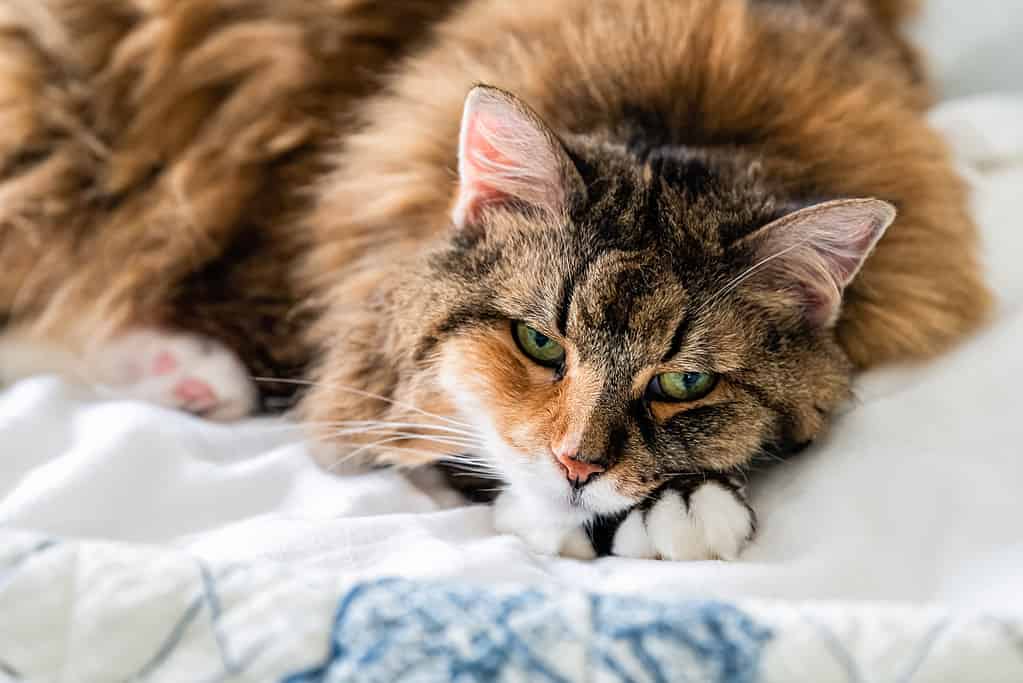
Kidney disease can affect cats of all ages, but elderly cats have a higher risk of suffering long-term effects.
©krblokhin/iStock via Getty Images
Indoor cats live a better life than feral cats. They have a loving family tending to their needs, access to medical care when necessary, and the security of sleeping in a secure house devoid of parasites and predators.
However, the comfort of indoor living presents new threats that feral cats may not experience. Health problems like obesity and periodontal disease are rampant in middle-aged cats because of their sedentary lifestyle. Elderly cats have a higher risk of developing kidney disease due to indoor living. Without direct medical attention, most senior cats will succumb to kidney disease near the end of their life.
This raises the question why kidney disease is so prominent in older cats. Is kidney disease the same as renal failure? What happens to cats during renal failure? Can owners do anything to support their cats while combating this threat?
What is Kidney disease?
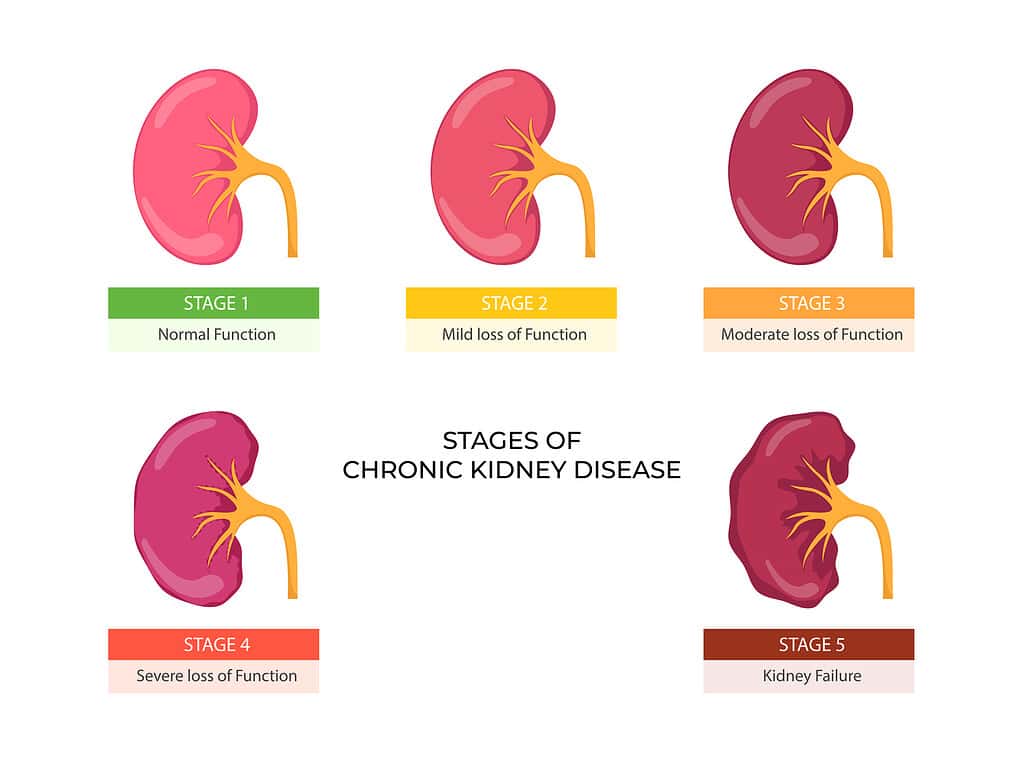
Kidney disease goes through several stages of deterioration but may develop faster in acute cases.
©agung fatria/iStock via Getty Images
Kidney disease is a condition where the kidneys cannot perform their basic job of filtering waste from blood. The kidneys are a filtration system to clean the blood before recycling it back into the body.
Patients with kidney disease will lose more nutrients, leading to weakening of kidneys and the whole body. A clear indication of kidney disease is high levels of potassium in their urine, which can be checked by a urinalysis test at a veterinary office. Potassium maintains fluid levels in cells, helping the muscles and stabilizing blood pressure.
During kidney disease, excessive fluid and waste products remain in the blood, which is then circulated throughout the body. This increases the risk of other health problems like hair loss, dehydration, and urinary tract infections which are dangerous for elderly cats.
Types of Kidney Disease in Cats?
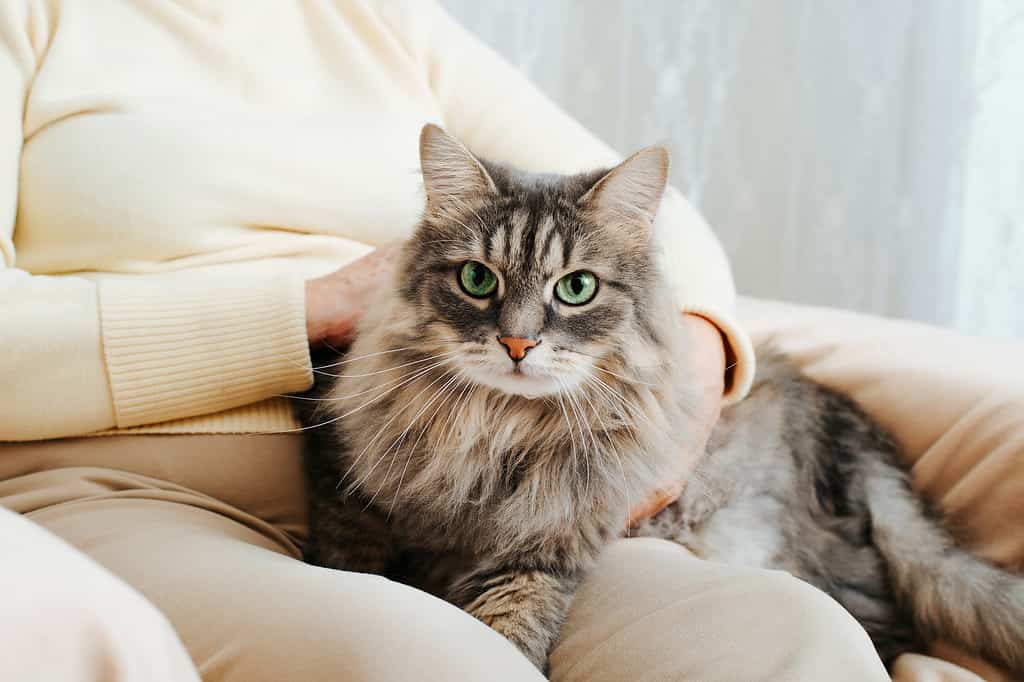
All animals, including humans, are susceptible to kidney disease from poor nutrition and kidney damage.
©Sergey Dementyev/iStock via Getty Images
Cats and other animals suffer from two types of renal failure: acute and chronic.
Acute renal failure happens suddenly and lasts for several days or weeks. This can happen to cats at any age due to infections, drinking poisonous materials, or trauma to the bladder.
Chronic kidney disease (CKD) is the most prominent disease middle-aged and elderly cats will experience. The kidneys gradually weaken until they fail over the course of months or years. Senior cats suffering from CKD have many health problems relating to their urinary tract, skin care, coat care, and immune system.
Signs of Kidney Disease in Cats
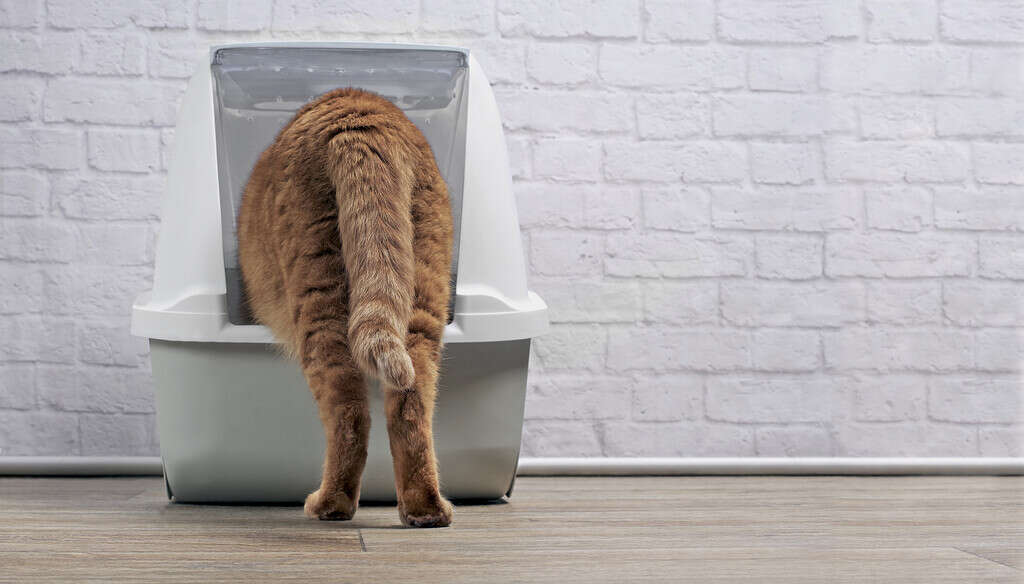
If a cat is straining to use a litter box, something is wrong. They should be seen by a vet immediately.
©Lightspruch/iStock via Getty Images
Cat owners know that cats love routine and having a set schedule. When a cat noticeably acts against his usual routine, it indicates something is wrong.
Signs of kidney disease are:
- Frequent urination
- Accidents outside the litterbox
- Chronic urinary tract infections
- Decreased appetite
- Weight loss
- Vomiting
- Diarrhea
- Blood or cloudy urine
- Bad breath
- Dry coat
- Constipation
What Causes Kidney Disease in Cats
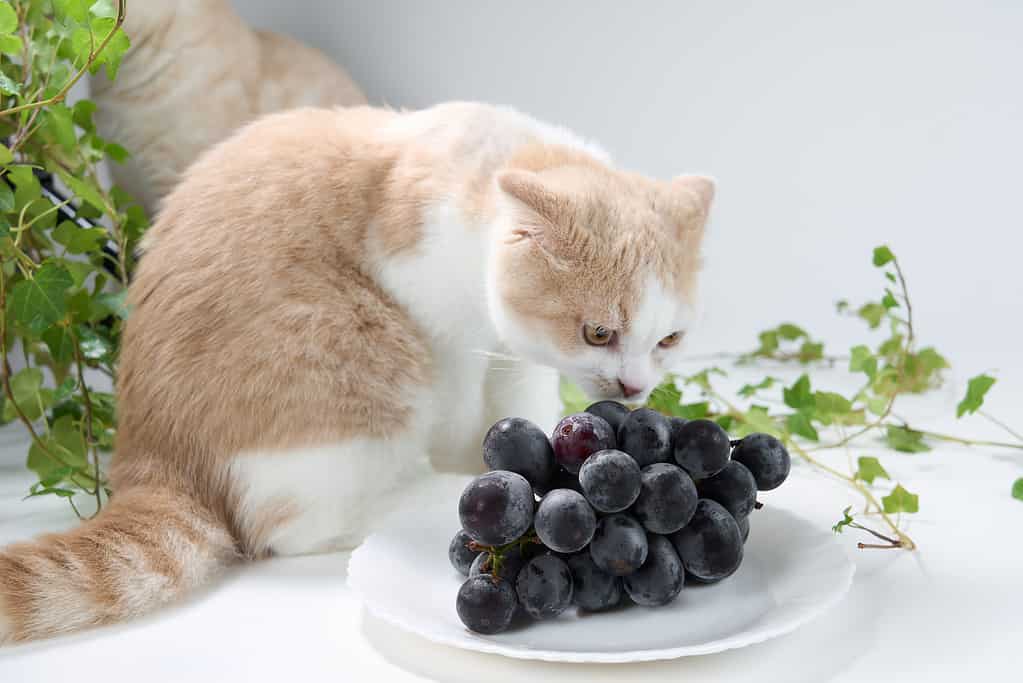
Grapes are highly toxic foods that can be lethal when ingested by cats and dogs.
©mapo/iStock via Getty Images
Cats have a higher chance of developing kidney disease due to several factors ranging from genetics, injury, or other problems affecting the kidneys.
Genetics: Some cats like Persians and Abyssinians have a higher chance of experiencing kidney disease due to genetic traits. Both felines suffer from amyloidosis, a trait causing high protein deposits in their body which increases the risk of kidney disease.
Inadequate Hydration: Indoor cats do not drink as much as feral cats. Feral cats get their hydration from hunting prey and various freshwater sources. Indoor cats fed dry food do not get hydration benefits in their diet. Without proper hydration, dry foods with high protein counts will increase the risk of kidney disease.
Infections: Bacterial and fungal infections gradually weaken the kidneys. Chronic infections reduce the efficiency of the kidneys, leading to more waste in the blood.
Kidney Stones: Kidney stones are formed from chronic bacterial infections, genetics, high protein diet with low moisture, or minimal fluid intake. These stones are a combination of salt, potassium, protein, and calcium which can block the pathways through the cat’s filtration system.
Blocked Kidneys: The kidneys will become blocked if too many kidney stones form and prevent fluids from exiting the bladder and body effectively. This leads to cats trying to use the litter box to pee with nothing coming out. Too much build-up causes pain and stress on the bladder and kidneys.
Body Trauma: Direct impact against the body where the kidneys and bladder are located may lead to acute kidney disease. Elder cats may suffer from deeper wounds from their weakened bodies and slower recovery rates. Additionally, drinking toxic materials like antifreeze, pesticides, or flowers may cause renal failure.
Detecting Kidney Disease in Cats
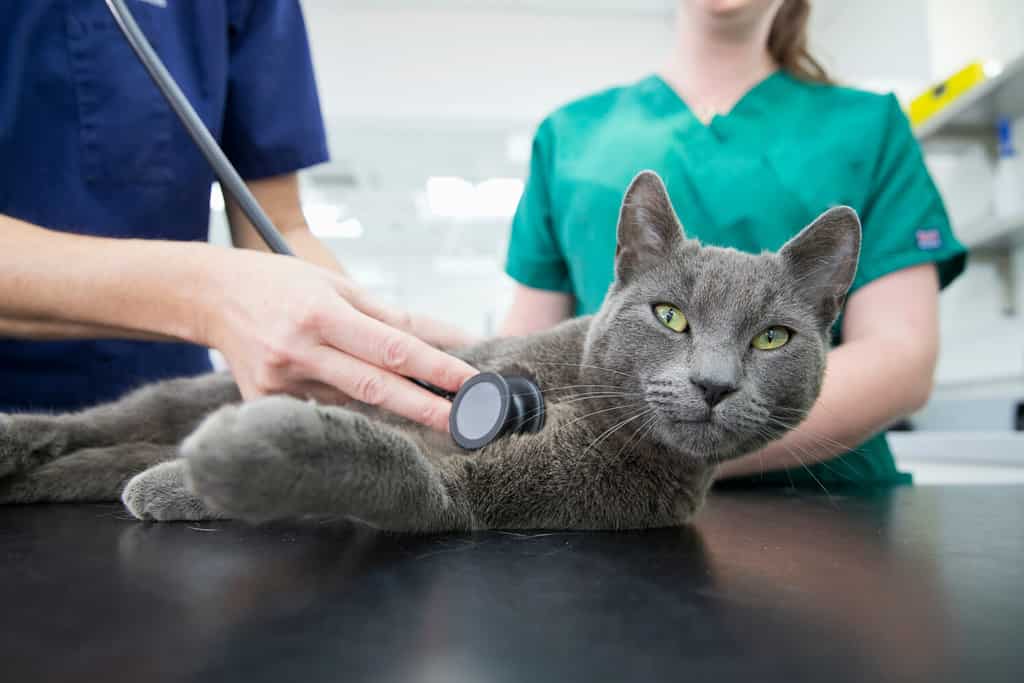
Cat owners should take their cats to the vet for routine visits and diagnostic testing once or twice a year.
©Juice Flair/Shutterstock.com
If a cat develops any of the symptoms above, they must be taken to a medical professional soon. Veterinary staff will perform diagnostic testing to find the root of the problem.
Diagnostic tests to detect kidney disease are:
- Blood tests that check for urea-nitrogen and creatinine levels in the body.
- Urine tests measure the specific gravity and amount of protein particles in the urine sample.
Looking for elevated levels of protein, potassium, phosphorus, and calcium in the urine and blood will indicate if the kidneys are filtering out the excess waste effectively or not.
Risks of Kidney Disease in Cats
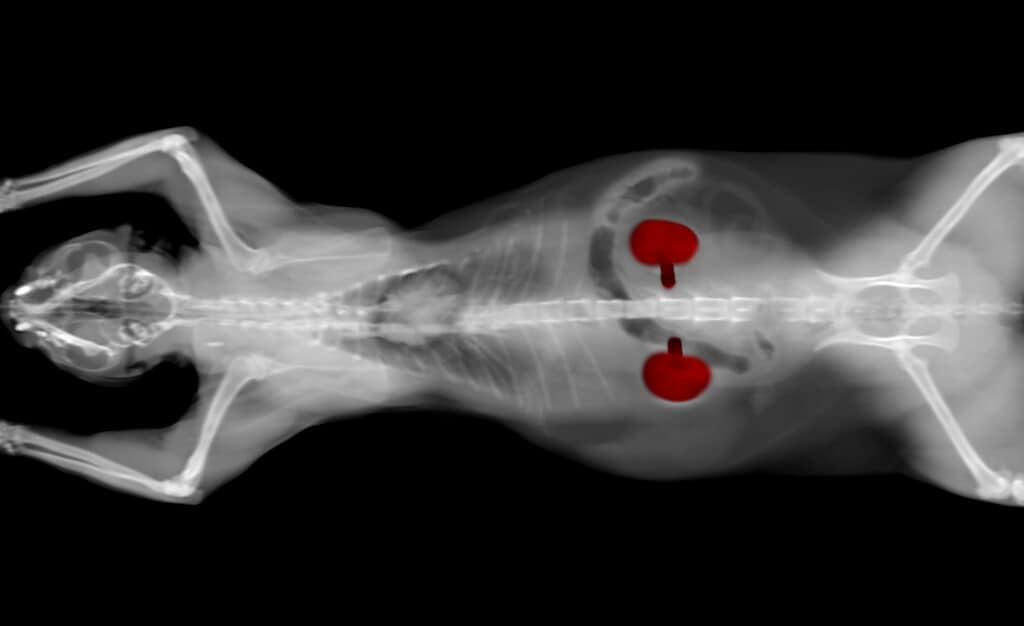
Direct damage to the kidneys will damage the kidneys and cause renal failure.
©bennymarty/iStock via Getty Images
Because older cats have a slower immune system due to old age, their bodies will be at higher risk of detrimental side effects of kidney disease. Young and mature cats can still combat some effects, but the older they get, the more strain it puts on their bodies.
Senior cats will suffer:
- An increased risk of chronic bladder infections
- Poor coat quality and fatigue
- Seizures from malnutrition and poor neurological responses
- Weakening muscles or immobility
- Anemia from low red blood cells
- Seeking shelter and hiding (sign a cat is sick and vulnerable)
Treating Elderly Cats with Kidney Disease
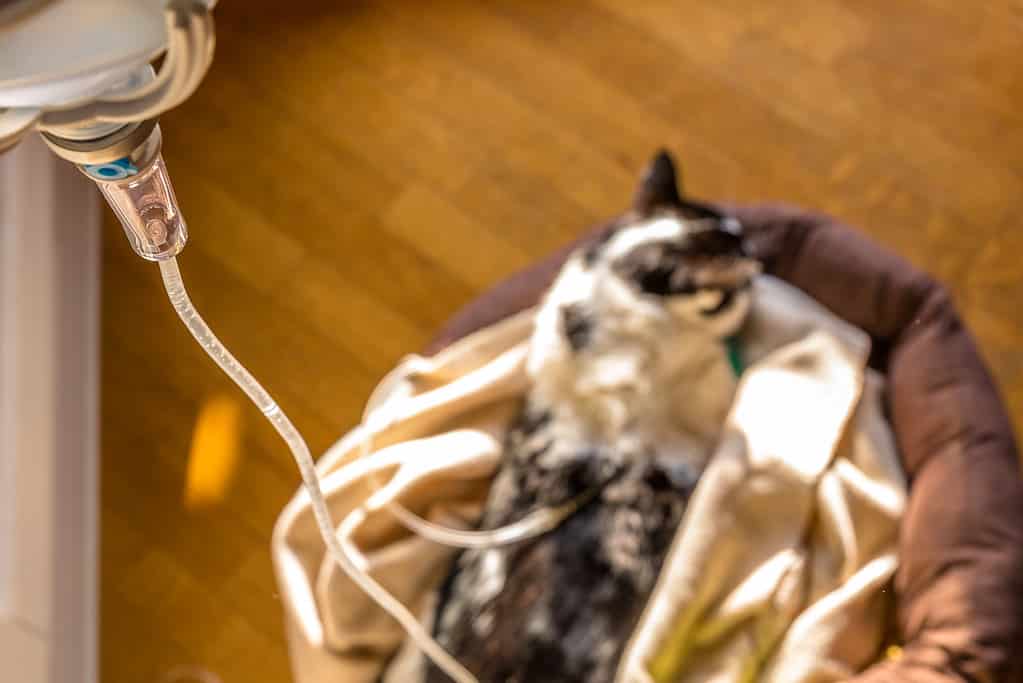
Veterinary technicians can instruct cat owners to give fluids under the skin to provide extra hydration.
©bennymarty/iStock via Getty Images
Treating an elderly cat for kidney disease is difficult, and there is no direct cure. Once the kidneys have sustained damage, there is truly little medical staff can do to regenerate those cells albeit replacing the damaged kidney entirely. Unfortunately, elderly cats have a higher risk of suffering from long surgeries and may not recover.
Speaking with a medical professional regarding how to treat an elderly cat is vital to their overall health. All cats will act, behave, and tolerate medications differently. It is important to find a veterinarian an owner trusts and who will provide clear communication and guidance on how to proceed.
Common suggestions for supporting a cat with kidney disease are:
- Kidney-Safe Foods: Veterinarians and dieticians may suggest feeding foods that are easy to digest and filter for the kidneys. This includes foods low in protein, salt, potassium, and phosphorus. With less of these materials going into the body, there will be less to filter out of the body.
- Antibiotics: Providing antibiotics and probiotics to elderly cats will help regulate the good bacteria in their body. Antibiotics will combat the bacteria causing chronic infections, supporting the kidneys and immune system.
- Nutritional Supplements: Elderly cats need their vital nutrients more because their bodies process things slower. Providing supplements that are specifically measured for the cat will help them absorb the appropriate amount without excess flowing into the blood.
- Hydration: Senior cats do not drink as often and need to keep properly hydrated to help filter out excess waste, as well as prevent muscle and joint diseases like arthritis. Veterinary technicians can instruct homeowners on giving fluids at home or give fluids in the clinic to help provide additional hydration.
Depending on the severity of the condition and the age of the cat, it would be beneficial to discuss end-of-life care. It is difficult to admit, but kidney disease is a leading cause of death in elderly cats because their kidneys weaken over time, and they are fed high protein diets with inadequate hydration. It might be better to make them comfortable at home than stress them out with car rides and continual vet visits.
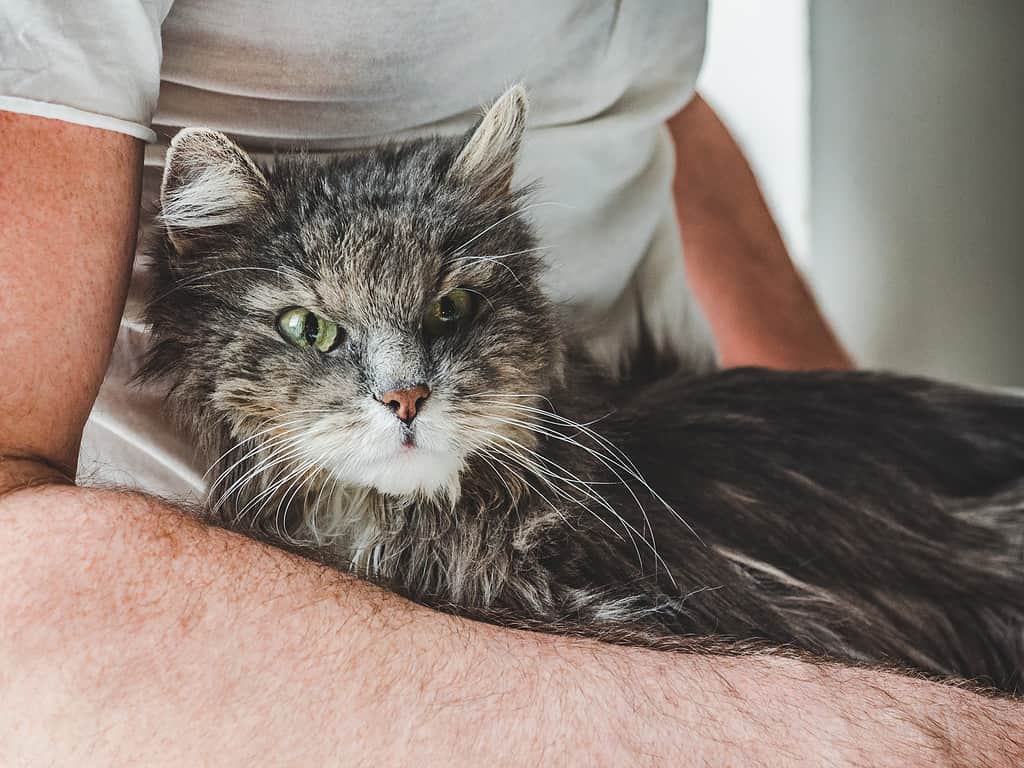
Senior cats have a higher risk of succumbing to diseases due to a slower immune system and recovery.
©Sviatlana Barchan/iStock via Getty Images
Kidney disease is a difficult diagnosis to accept. Cat owners work hard to ensure their feline companions have everything they want in the world, but they cannot account for age or diseases developed over time. Some cats may genetically get it while others have an imbalanced high protein diet to hydration ratio to cause it later in their life. Cat owners should always speak with a medical professional regarding how to handle kidney disease in their cats and talk with other cat owners about how they may prevent it in the future.
What Counts as Elderly Cats?
A senior cat is 11-14 years old. After that, cats are called geriatric, and they may need constant medical care to stay healthy.
Do Feral Cats Suffer from Kidney Disease?
It is highly possible feral cats may suffer from acute kidney disease due to trauma or ingesting a toxic material. Feral cats do not live as long as indoor cats, so the likelihood of them having chronic kidney disease is low.
Is Kidney Disease and Renal Failure the Same?
Yes, kidney disease and renal failure are two terms used to describe the same condition. Medical personnel use the terms interchangeably. Sometimes the phrases will be mixed to become kidney failure, which indicates the kidneys actively failing.
The photo featured at the top of this post is © Liam Bell/iStock via Getty Images
Thank you for reading! Have some feedback for us? Contact the AZ Animals editorial team.






